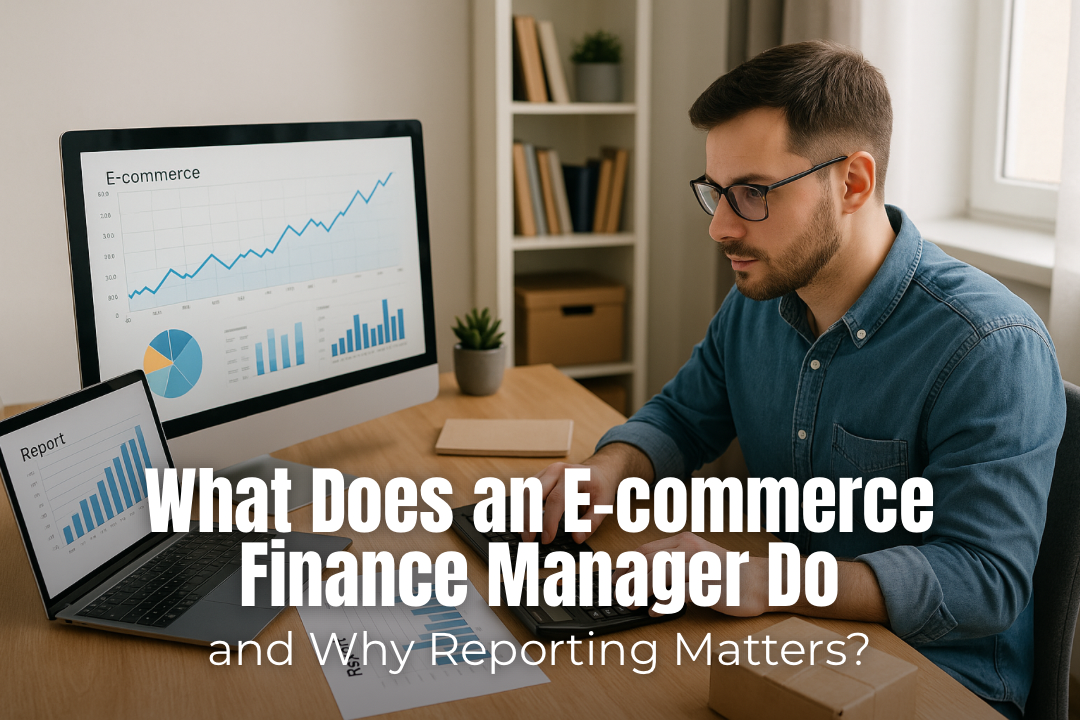Yes, accountants are important — they make sure the books are clean. But what’s missing is someone who can connect financial data with operations and strategy. That “missing link” is the financial manager.
What changes once a financial manager
steps in?
When a company hires its first financial manager in eCommerce, the shift is immediate:
Cash flow visibility: instead of guessing if there’s enough money for the next shipment, you have forecasts based on real payouts, advertising costs, and supplier terms.
Profit clarity: you stop measuring success by revenue alone and see true profit after ads, logistics, and marketplace fees.
Budget discipline: advertising and operational expenses stop being “open taps” and start being measured against ROI.
Inventory confidence: no more accidental stockouts or warehouses full of slow-moving products.
This is not “extra paperwork.” It’s the foundation for growth.
Why eCommerce is different?
Traditional finance roles don’t fully cover the complexity of online retail. In eCommerce, a financial manager must deal with:
Multiple sales channels (Amazon, Shopify, Walmart, Chewy).
Delayed payouts from marketplaces.
Constantly shifting advertising costs.
International suppliers and multi-currency operations.
High return rates compared to offline retail.
These variables make a financial manager in eCommerce not just helpful, but essential once a company moves beyond the first growth stage.
The hidden cost of chaos
One of the strongest patterns recruiters observe: the more chaos inside the company, the higher the salary expectations of candidates.
Top specialists don’t want to spend hours cleaning messy spreadsheets or manually reconciling transactions. If a role looks like endless “firefighting,” it stops being attractive. In such cases:
Candidates expect a much higher salary to compensate for the workload.
Some won’t even consider the position unless another accountant is part of the team.
That’s why documenting processes and automating tasks is crucial. The more structured your workflows, the more likely you’ll attract a strong financial manager in eCommerce — at a fair market rate.
When does the role become necessary?
There’s no single revenue threshold, but practice shows:
Up to ~$1M: outsourced bookkeeping is usually enough.
$1M–$3M: complexity rises, but you may manage with partial support.
From ~$3M: a part-time financial manager becomes almost unavoidable.
From ~$5M+: the role should be full-time.
Important: revenue is not the only factor. The number of SKUs, suppliers, and sales channels often matters more. A company with 50 SKUs and three suppliers may wait longer than one with 500 SKUs across five marketplaces.
What to look for in candidates
A strong financial manager brings a mix of technical and strategic skills:
Advanced Excel / Google Sheets for analysis and dashboards.
Experience with QuickBooks, Xero, Zoho or similar tools.
Understanding of Amazon FBA (fees, payouts, sales tax).
Ability to forecast, plan budgets, and model different growth scenarios.
Track record of process automation.
Strategic mindset: translating numbers into business decisions.
👉 Having Amazon-specific experience is a bonus. But don’t make it a dealbreaker — strong finance professionals with eCommerce background can adapt quickly to any marketplace.
Why early hiring saves more than it costs
Many founders hesitate because they see the role as “extra overhead.” But the truth is, delaying the hire usually costs more:
Overspending on ads without ROI analysis.
Stockouts or overstock tying up capital.
Missed tax compliance or penalties.
Incorrect forecasting that derails growth.
Hiring a financial manager in eCommerce is not a cost — it’s an investment in clarity and sustainable scaling.
Final thoughts
The difference between “surviving” and “scaling” in eCommerce often comes down to financial control. A financial manager in eCommerce transforms numbers from confusing spreadsheets into actionable insights.
Companies that hire early and structure their processes attract stronger candidates, save money on salaries, and scale with confidence.
At Talents Boutique, we’ve seen many eCommerce brands unlock growth simply by bringing in their first financial manager. It’s often the turning point where founders stop guessing and start leading with data.












